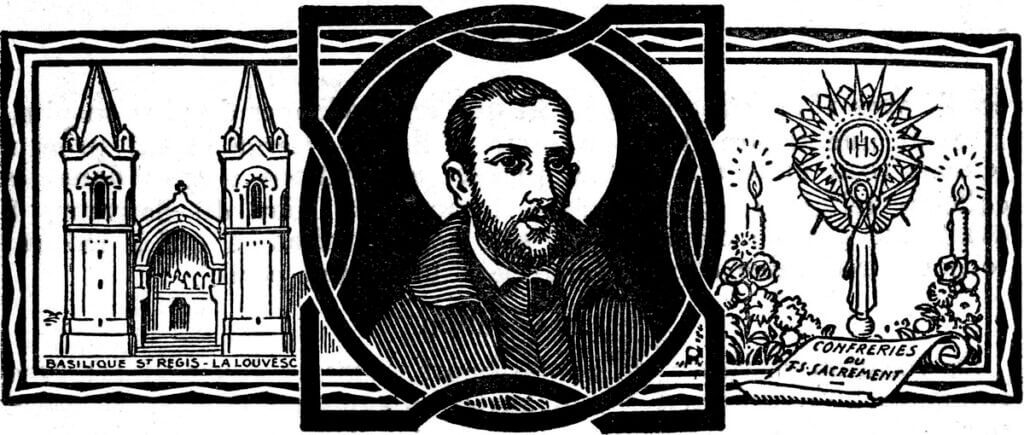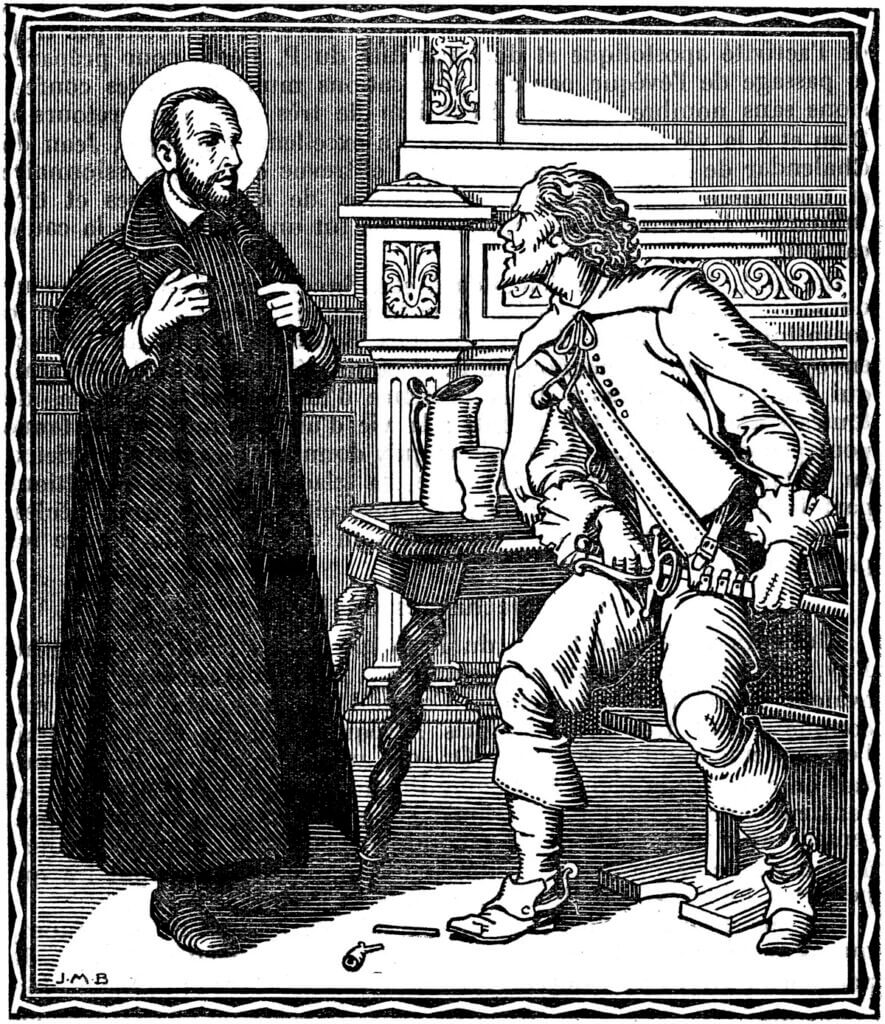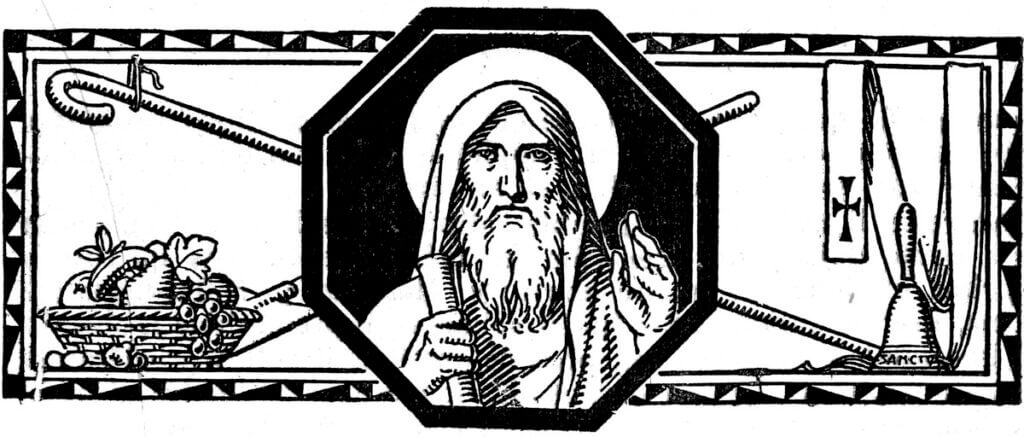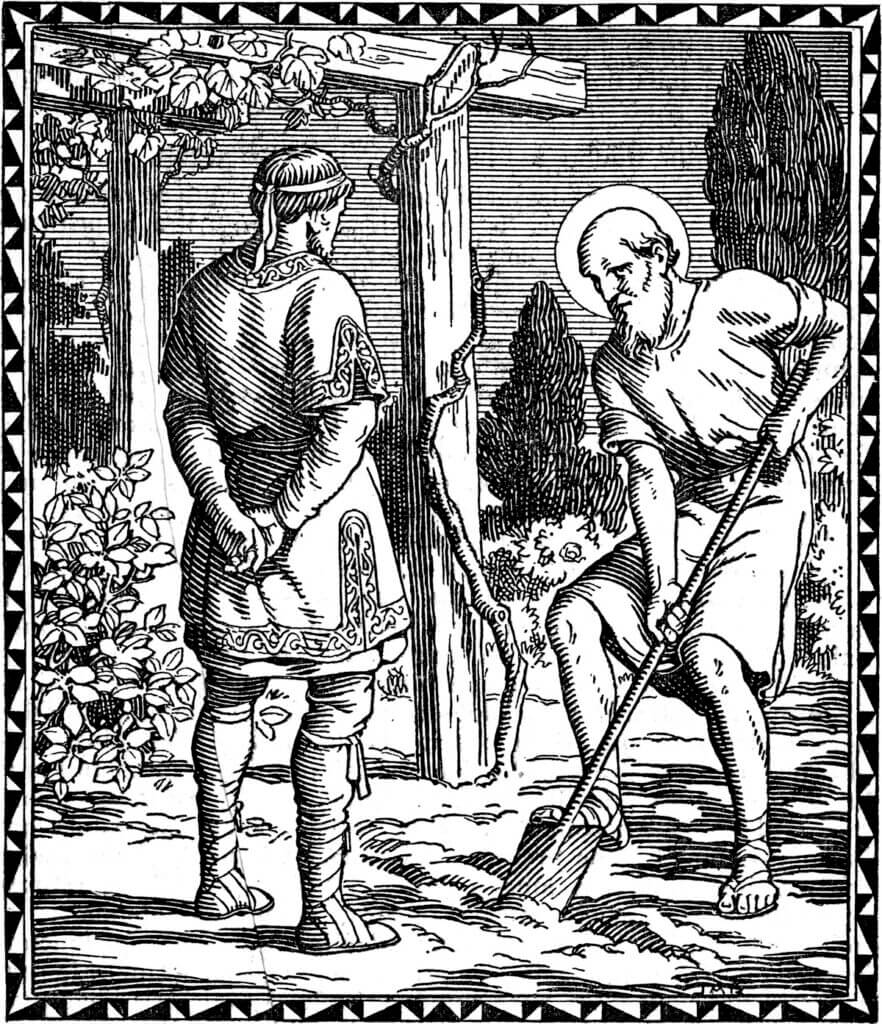Jesuit, apostle of Vivarais and Velay (1597–1640)
Celebration on june 16th.

Among the many Saints that the Society of Jesus has donated to the’Church, John Francis Regis is one of the most illustrious. His way was quite different from that of the religious of his Order; certain traits of’ of his career, which are also told of’other Saints, might shock us, but, in the circumstances of time and places where God placed him, he had a misdiction to please; he had to acquit himself with admirable zeal, perfect abnegation and unlimited obedience.
Jean-Francois Regis was born on January 31, 1597 in Fontcouverte, the current diocese of Carcassonne. His parents were people of small nobility, having an easy situation, and enjoying the consideration. His family declared themselves by their loyalty to the Catholic faith in this country turned upside down by the struggles against the Huguesnots, and himself lost a brother to the diocese of Villemur, at the current diocese of Toulouse.
First years.
From his early childhood he knew the sweetness of piety and the love of God. At the age of five he was so deep struck by the thought of the loaves of hell that he expressed to his mother with terror the thought of damnation. He had no taste for the amusements of children his age, preferring serious things and occupying himself only with exercises of piety. Often he would shut himself up in a chapel, and there, giving himself over to the sweetness of contemplation, he would forget himself in the presence of Our Lord.
His parents had given him a tutor with a brusque and gloomy temper; the timid and modest child suffered much from this direction, but the day the master knew how to find the way to the child's heart, he made rapid progress.
Soon, the Jesuits having opened classes in Beziers, he was embedded to them around 1611, and his piety only developed more and more. He had a tender devotion to the Holy Virgin and was promptly received into one of those pious associations erected in religious colleges, and intended to honor the Mother of the Savior. He had great confidence in his guardian angel, to whom he always believed himself unharmed for having escaped from a great peril.
The vocation.
His vocation was revealed early in the gentleman and salvation influence he was able to take over his fellow students, who were scattered in small groups, according to custom, in private houses where they boarded. At first, some mockers ridiculed his religious practices; soon, they recognized the power of his virtue, and far from distancing themselves from their pious companion, they drew so close to them that Jean-Francois won their souls. For the five or six schoolchildren with whom he lived, he composed a written rule, in which the hours of study were fixed, useless conversations forbidden; a book of piety was read during meals, an examination of conscience was made in the evening, and on Sunday all received Holy Communion.
The pious young man was at this time, it seems, tested by a serious illness. Having recovered his health, he thought of giving himself to God in a more complete way and made a retreat to know his vocation. He felt urged to enter the Society of Jesus. His confessor having urged him to follow his inspiration, Jean-Francois entered the novitiate of Toulouse on December 8, 1616.
The novitiate.
From the first days he was admired by the most fervent people. Nothing could disturb his desire for constant union with Our Lord, and he never abandoned the thought of His presence. He applied himself particularly to practising humility, self-hatred, contempl for the world, and the pleasure of procuring the glory of God, a very great charity towards his neighbour.
The lowest jobs were those he cherished most; nothing seemed more pleasing to him than sweating the house and serving at table. His favorite occupation was definitely serving the sick.
He loved to go to hospitals and minister to the sick and the poor, choosing the most attractive ones, because he could see Jesus Christ himself in the person of those who were suffering. He treated his body very harshly, while showing kindness and gentleness to others; so his companions said that he was his own persecutor.
After two years of novitiate, Jean-Francois was sent to Cahors, where he pronounced his first vows, then to Billom, where he was a grammar teacher, and from there to Tournon to study philosophy. The taste for studies in no way weakened his piety and his taste for prayer.
First apostolate.
During his stay in Tournon, he began to evangelize the poor and the servants of the city. This preaching to the little ones and the weak followed his humble and devoted nature. On Sundays, he accompanied a religious priest from the college and trained through the surrounding villages and towns; he had a bell ring before him; he gave the children, give them catechism and teach them to love the Savior Jesus. Then, having similarly prepared the more or less neglected Christians, he brought them to the Father who heard their confession.
His taste for the apostolate finally displayed itself in a definitive way in the sanctification of the town of Andance, where his memory has remained very much alive. There, he worked wonders; drunkenness, wearing, impiety reigned supreme there; instead, Brother Regis established the practice of the sacraments, the frequent reception and worship of the Eucharist, he had the glory and happiness of instituting a brotherhood of the Blessed Sacrament there, as other Jesuits before him had done in the region; he was then only twenty-two years old.
However, the time for major works had not yet come, and his superiors thought it appropriate, in 1625, to send him to the town of Le Puy to teach literature.
Teaching.
In Le Puy, as previously in Cahors, Jean-Francois Regis thought not only of instructing his students, but also of directing them in good. He prepared his classes with the greatest care and found no surer way of teaching fruitfully than to go and pray before class time in front of the Blessed Sacrament; it was noted that, despite the great cold, in a spirit of mortification, he did not even hide his hands in his sleeves. He healed one of his sick students by making the sign of the cross over him and recommending that he hesforth be more fervent in the service of God. On feast days, he ran to exercise his apostolic zeal among the people of the countryside.
A professor in Auch in 1627, Father Regis was sent the following year to Toulouse to study theology. At night he would get up to go to the chapel; the superior was informed and, as if inspired, he replied:
– Do not disturb the conversations of this angel with his God; I am very much mistaken if his feast is not celebrated some day in the Church.
Ordination.
At the beginning of 1630, Jean-Francois received the order to prepare for the priesthood; a struggle then arose in his heart; and; zeal for the glory of God and the desire to win souls made him desire this honor, while his humility filled him with a holy fear. His hesitations fell away and he even asked, contrary to custom, that his ordination be brought forward by a year, which would forever remove from him the right to be, strictly speaking, a professed religious, without, however, ceasing to belong to the Society of Jesus; this sacrifice was accepted, and Father Jean-Francois Regis was ordered priest at the Trinity of 1631. He prepared for his first mass by fasting, prayers and mortifications.
Apostolate of the Poor.
A few months later, the young priest had to make a trip to Fontcouverte, his birthplace. He went there on family business, but the things of God occupied him much more than the interests of this world.
This is how he spent his time: in the morning he learned catechism to the children, then he preached, then he heard confessions, and towards night he gave a new instruction. In the middle of the day he visited the poor, begged for them at the homes of the rich, and then took his alms to the old and the sick.
He would continue this program in many places where his missionary career would take him.
One day, as he was crossing the streets, carrying a straw mattress on his shoulders, he was jeered by soldiers. Father Regis was filled with joy at seeing himself assimilated to his divine Master, and like him insulted. His brothers believed they should make observations to him on his conduct so far removed from the maxims of the world, and which could only be admitted by those who understand the folly of the cross:
– Exercise, they said to him, the works of mercy, but do it without covering us with shame and ridiculous.
– It is not by humbling themselves, replied Jean-Francois, that the ministers of the Gospel lose their character; and provided that God is not offended, what do the judgments of men matter!
Indeed, this boundless charity acknowledged hearts to him, and he had the consolation of bringing many souls back to God, leaving in the country, wrote his provincial, a great odor of holiness.
These consoling successes convinced his superiors to enter him exclusively with the mission of the apostolate. He began in May 1632, in the city of Montpellier, very tried by the civil wars of religion during the reign of Louis XIII, and he made many conversions there, not by brilliant sermons, but by his example and the explanation of the catechism.
He had a real preference for the poor; he often remained in his confessional until evening, without taking food, in order to hear the confessions of the unfortunate, saying: "People of quality will not lack confessors; the poor, this most abandoned portion of the flock of Jesus Christ, such must be my portion." He was not content to give them kind words, he helped them, as we have already seen him do elsewhere, with the alms he collected.
In this city, too, he worked to convert the Magdalenes, who, following the example of their holy patron, wanted to water the feet of the Savior with their tears and renounce their sins. He excelled in this task, not shrinking from any danger, not even that of covering himself with ridiculous or shame.
Missions in the South of France among the Protestants.
In 1633, Bishop de la Baume de La Suze, Bishop of Viviers, who had asked for a Jesuit missionary to accompany him through his diocese, was given Father Regis; the country had suffered greatly from religious struggles, and the memory of the two Jesuits martyred in 1593, the wounded Jacques Sales and Guillaume Saultemouche, was not about to disappear. It is true that religious from various Orders had already worked effectively for the religious recovery of the region. Alas! much remained to be done, and it was not too much of the apostolic activity and humility of Father Regis to prepare the passage of the bishop by multiplied preachings, countless confessions, which represented very many returns to God and to the Christian life. At Uzer, an excellent Catholic, Jean de Chalendar de La Motte,arranged an interview between the missionary and a noble lady, an obstinate Protestant, of pure morals and very influential; the abjuration of this person was a success for the Catholic cause.
In 1634, Father Regis asked his Superior General for the favor of leaving as a missionary for Canada; but obedience kept him at his post. The region of Routiers where he was soon sent with a companion, Father Broquin, was the corner of Vivarais that most needed the presence of an apostle; crimes of all kinds were frequent there; the life of a man was held for little. Now, the missions that the two religious give there, fighting against the wind, the snow, the ice, in some heroic conditions, accomplished wonders: after three centuries. Le Cheylard, in particular, has remained one of the most fervent points in France.
The Catechisms of Le Puy.
Several years of Father Regis' life would then pass in Le Puy, where rich and poor alike, suffering from religious ignorance, had forgotten the right path. What this population needed, as the bishop, Just de Cerres, had understood very well, was the teaching of the catechism. Now, who better than Father Regis could take on the task? Every Sunday, 4 to 5,000 people came to hear his instructions, simple, figurative, lively, presented with much of the southern eloquence; no resort to mythology or antiquity, but a popular eloquence that penetrated all minds and all hearts.
These successes of the preacher annoyed a renowned orator, who believed he should deny him to the provincial superior; the later, passing through Le Puy, insisted on seeing for himself; and; twice he went to hear Father Regis' religion class and could not help crying: the ordinary thus turned to the advantage of this marvellous catechist.
Moreover, let no one imagine this apostle passing through the streets with his eyes and ears closed; having heard a masked man blasphemy in the street, he went to slap him; he put mud in the mouth of a woman who had committed the same sin; the first immediately knelt down under the wounding of the Father; the second went away with her head bowed: for such was the prestige of his business.
But also, what mortifications he imposed on his body to keep his soul closer to God and to buy conversions! His discipline was an instrument of "carnage", and despite his harsh life and his southern origin, he never drank wine, offering to God this heroic sacrifice, given the circumstances, in order to obtain perfect chastity, without any trouble. This grace was granted to him, as it was to Saint Thomas Aquinas and to Saint Therese.
The struggles against libertinism earned him mockery, insults, death threats; he never packed down. More than one young girl owed him the preservation of her virtue; he made many a fallen woman a penitent, thanks to a house of refuge that he had founded.
Men thought in their impure passions planned to kill him: he went to meet them and encouraged them themselves to renounce their secret design and to change their life. Indeed, he sometimes read in the consciences, announced the future; it is thus that he predicted to the lace-makers of Puy, who were later to take him as Patron, that their industry, threatened by ordinances, would develop on the contrary with the royal protection: it was soon so.
Last illness and death.
The last part of his life was spent in winter missions; only readers who know the harshness of mountain winters can understand the difficulties and sufferings that the missionary endured. He was to die on the field of honor, during a mission he gave at La Louvesc, at Christmas time 1640. Before going there, having a presentiment of his approaching end, he went to Le Puy, put his affairs of conscience in order, settled some debts contracted for the poor and reached his work station. On the way, in terrible weather, he got lost during the night, and, despite pneumonia that had broken out, had the courage to go to La Louvesc, to preach five or six times and to hear confessions for three whole days. On the evening of the day after Christmas, he died, was taken to the rectory where he heard confessions again.But the doctors judged his condition to be hopeless.
The missionary received the Viaticum and the last sacraments with great fervor; he found relief from his sufferings only in the sight of the Crucifix. On December 31, he said to his companion: "Ah! my Brother, I see Our Lord and Our Lady opening paradise to me!" Then he shouted out: " In manus tuas... Lord, I commend my soul into your hands." These were his last words.
He was proclaimed a saint with one voice; the earth of his tomb was removed several times as a precious relic. The people of La Louvesc, having learned that the body of the Father would be transported to Tournon or Le Puy, buried it in the earth and placed crossed iron bars above it. Thirty-six years after his death, official steps were taken for his beatification, which took place under the pontificate of Clement XI, on May 8, 1716; finally, he was canonized under that of Clement XII, on May 8, 1737.
Quite frequently we hear that at the time of his death, Saint John Francis Regis no longer belonged to the Society of Jesus, or that he was on the point of being expelled; this is a malicious statement launched, around 1716, by the Jansenist reviews and which history denies, with supporting evidence.
His wright.
During the Revolution, the relics of the Saint were put in a safe place, replaced in the church by a box of bones. They returned to their place in 1802. A magnificent basilica, built in La Louvesc by the architect Bossan, from 1865 to 1871, sees thousands of pilgrims flock there every year.
A pious association, intended to regulate illegitimate unions, was placed under the invocation of Saint John Francis Regis. This great Saint, who restored health to a pious magistrate, Mr. Gossin, vice-president of the court of the Seine, inspired him with this good thought and thus perpetuated, beyond the tomb, the good that he never ceased to do during his pilgrimage on earth.
Again under the auspices of the Zealous missionary, the double Institute of the Sisters of Saint Regis and the Ladies of the Cenacle, and that of the Sisters of the Presentation of Bourg-Saint-Andeol were born; Ven. Mother Duchesne, who propagated the Institute of the Ladies of the Sacred Heart in America, possessed her vocation to him, and it was to him that the future Saint John the Baptist Vianney had recourse, unable to advance in his studies, and who was to later, while adapting his life to the circumstances and necessities of his ministry, take him as a model.
A. D.
– Les Petits Bollandistes. – Joseph Vianet, Saint Francois Regis (Collection Les Saints). – R. P. Daubenton, S. J., Vie de saint Jean-Francis Regis (1855). – R. P. Frederic de Curley, S. J., Saint John Francis Regis (1893). – Abbot Blancard, parish priest of Fontcouverte, Saint Francis Regis, his life, his miracles (1916). – (V. S. B. P., nbones 227 And 644.)
Source: https://laportelatine.org/spiritualite/vies-de-saints/saint-jean-francois-regis
Tags: #Download, #Saints History, #Lives of Saints, #Saints History in Tamil,



